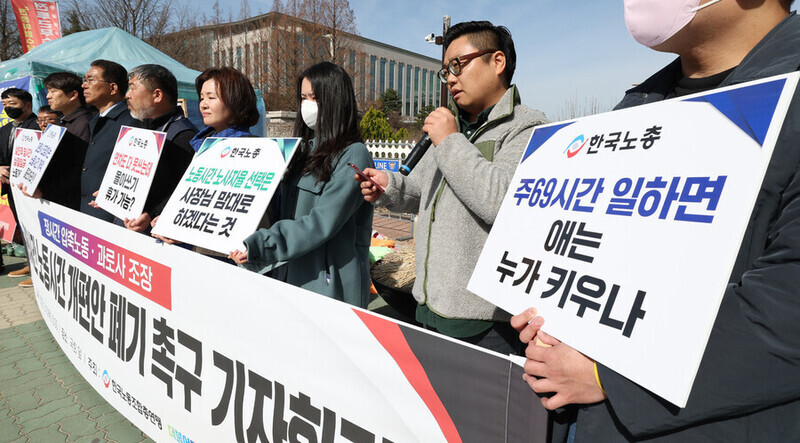hankyoreh
Links to other country sites 다른 나라 사이트 링크
[Column] Moving in the wrong direction: President Yoon’s assault on working time


Working time reduction was a major achievement of the Moon Jae-in administration. One could argue that allowing a working week of up to 52 hours did not go far enough — the European Working Time Directive, for instance, stipulates no more than 48 hours, and Koreans still work some of the highest annual hours among members of the Organisation for Economic Co-operation and Development (OECD). The progressive legislation was nonetheless an important step towards breaking Korea’s dysfunctional workplace culture of long hours.
The Yoon Suk-yeol administration might claim that their working time policy presents a “new paradigm,” but it is no more than an ill-informed attempt to return to the past. Surely, business applauds the government, but one should not confuse the interests of business and the needs of the economy — let alone the needs of society.
The proclaimed “right to choose” is, of course, meaningless in a context of a power imbalance between employers and employees, and greater flexibility for firms rarely delivers greater autonomy for workers — autonomy for better work/family reconciliation, for example.
But it gets worse: the government also shows a poor understanding of economics if it believes that increasing working hours is the answer to population aging. Yes, the working-age population is shrinking, and this is a major challenge. But smart public policy, especially in the Korean context, recognizes that population aging calls, first and foremost, for better mobilizing the working-age population and for using workers more productively.
Looking at the employment rate, for example, reveals considerable potential in Korea, especially among women. The country’s female employment rate of merely 60% compares poorly to the vast majority of developed countries, and it is a concern that, by international standards, economic activity among highly educated women is particularly low. In principle, there is no reason why Korea could not achieve, for example, female employment participation in Japan (72.5%) and Germany (72.2%). Not only is women’s employment critical for boosting the economic growth potential but also fertility, as international research has demonstrated. If anything, the Yoon government’s policy of increasing working hours can be expected to suppress women’s employment participation — a fatal mistake.
International comparison also shows, among others pointed out by the OECD, poor labor productivity in Korea, especially in the service sector and in small- and medium-sized firms. A policy strategy that focuses on greater labor productivity is obviously a lot smarter than promoting overtime and long hours, with their harmful effects on the physical and mental health of workers. Not only do ill workers present a burden for the health system, it is also rather doubtful that greater ill-health of the working population is conducive to a recovery of the country’s ultra-low fertility rate. For this, good employment and work/family balance are imperative — the Yoon government is contributing to neither of those.
Trade unions are rightly protesting against Yoon’s assault on working time regulation, and the right-wing government’s attack on working people’s rights provides an opportunity for membership recruitment, including among professionals where unions have traditionally struggled. However, this episode should also remind unions that only the Democratic Party in government provides the prospect of advancing workers’ interests, and the European experience suggests the best prospects when organized labor and the political left work together. This requires the readiness to compromise, difficult compromises at times; but failure on the left strengthens the political right with detrimental consequences for ordinary people.
Please direct questions or comments to [english@hani.co.kr]

Editorial・opinion
![[Editorial] Yoon must halt procurement of SM-3 interceptor missiles [Editorial] Yoon must halt procurement of SM-3 interceptor missiles](https://flexible.img.hani.co.kr/flexible/normal/500/300/imgdb/child/2024/0501/17145495551605_1717145495195344.jpg) [Editorial] Yoon must halt procurement of SM-3 interceptor missiles
[Editorial] Yoon must halt procurement of SM-3 interceptor missiles![[Guest essay] Maybe Korea’s rapid population decline is an opportunity, not a crisis [Guest essay] Maybe Korea’s rapid population decline is an opportunity, not a crisis](https://flexible.img.hani.co.kr/flexible/normal/500/300/imgdb/original/2024/0430/9417144634983596.jpg) [Guest essay] Maybe Korea’s rapid population decline is an opportunity, not a crisis
[Guest essay] Maybe Korea’s rapid population decline is an opportunity, not a crisis- [Column] Can Yoon steer diplomacy with Russia, China back on track?
- [Column] Season 2 of special prosecutor probe may be coming to Korea soon
- [Column] Park Geun-hye déjà vu in Yoon Suk-yeol
- [Editorial] New weight of N. Korea’s nuclear threats makes dialogue all the more urgent
- [Guest essay] The real reason Korea’s new right wants to dub Rhee a founding father
- [Column] ‘Choson’: Is it time we start referring to N. Korea in its own terms?
- [Editorial] Japan’s rewriting of history with Korea has gone too far
- [Column] The president’s questionable capacity for dialogue
Most viewed articles
- 1Months and months of overdue wages are pushing migrant workers in Korea into debt
- 2[Guest essay] Maybe Korea’s rapid population decline is an opportunity, not a crisis
- 3Under conservative chief, Korea’s TRC brands teenage wartime massacre victims as traitors
- 4Dermatology, plastic surgery drove record medical tourism to Korea in 2023
- 5[Column] Can Yoon steer diplomacy with Russia, China back on track?
- 6First meeting between Yoon, Lee in 2 years ends without compromise or agreement
- 71 in 3 S. Korean security experts support nuclear armament, CSIS finds
- 8At heart of West’s handwringing over Chinese ‘overcapacity,’ a battle to lead key future industries
- 9[Editorial] Japan’s rewriting of history with Korea has gone too far
- 10[Editorial] Yoon must halt procurement of SM-3 interceptor missiles